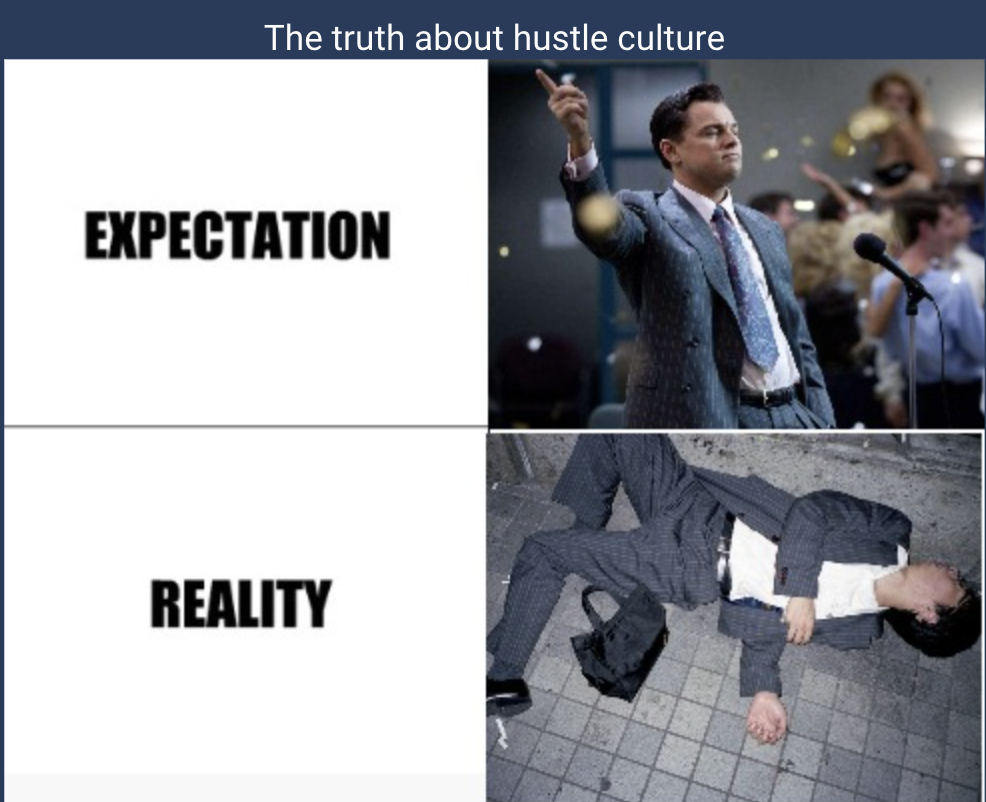In recent years, celebrities, influencers, and company leaders have glamorised a movement coined ‘hustle culture’. Scrolling through the newsfeed of your socials, it’s highly likely that you would have come across various posts with motivational captions accompanied by the hashtag, #hustleculture.
These social posts would depict the success of people in various forms such as a worker getting a promotion at work, or how someone ordinary managed to buy a new Lamborghini Aventador and purchase a new mansion.
The key messaging? Success can be achieved through “hustling”. However, hustle culture is losing its popularity today, often looked upon as a negative term rather than an inspiring one today.
Is there something wrong with the messaging, or is the idea too far-fetched?
But first, what is hustle culture?
Generally, the term hustle culture refers to the idea that one should always be working hard to achieve success. But how is this a new idea, since making effort to attain something is the basis of work?
The keyword that makes all the difference here is the word, ‘hustle’. Hustling doesn’t stop at just making effort, but also ensuring that nothing gets in the way of you achieving success.
To put it simply, if you want to be part of the hustle culture, you’re not to spend any of your free time on a non-productive activity. Yes, that includes watching Netflix on weekends when that time could be spent working towards your professional goals.
So, what’s wrong with working hard?
At a glance, hustle culture can be seen as positive. It’s about putting in the work, staying focused, and pushing yourself to achieve your set goals. However, there’s more to it than meets the eye.
While working hard non-stop seems doable on paper, in reality, it is very tough to accomplish. Imagine spending all of your waking hours working on your day job, even going back to the office on weekends to do work.
That may impress your boss, and perhaps earn you the pay raise or even the promotion that you’re eyeing. Or, maybe not.
As the saying goes: All work and no play, makes Jack a dull boy (or Jill a dull girl).
The problem with hustle culture arises when it becomes a toxic and all-consuming mentality that puts individuals’ health and well-being at risk. When you feel the pressure to constantly work and hustle, it can lead to burnout, stress, and a lack of work-life balance.
This can have serious consequences on mental health, physical health, and personal relationships.
Not convinced hustle culture is toxic?
1. It’s counterproductive
Hustle culture makes it seem like you need to be productive all day long. But guess what? That’s not humanly possible. Moreover, with burnout and exhaustion, you’ll end up achieving even lesser than what you aimed for.
Read More: Work Efficiency vs Productivity: What’s The Difference?
2. It breeds unhealthy competition
Imagine a scenario of two employees of the same designation working for a particular company. The first employee constantly works and responds to emails even after work hours, while the other prioritises work-life balance and unplugs after working hours.

During the appraisal cycle, the first employee gets a higher pay raise or even a promotion. The second employee sees this and also starts working longer hours to achieve the same. This sets the precedent for a culture of overworking in the company because more work now represents a person’s abilities and competence. More work seems to mean more money.
3. It affects mental and physical well-being
You’re human, not a machine. Overworking leads to high levels of stress, low levels of happiness and fatigue. All this will in turn affect your work performance and pull you further from reaching your professional goals.
4. It neglects work-life balance
There’s no such thing as work-life balance in hustle culture. The word ‘hustle’ is in there for a reason. Thinking of catching a movie date with your partner? Hit the playground with your kids? Travelling to Bangkok with friends over the long weekend? It’s a no to all of the above.

Hustle culture at the workplace
Hustle culture affects workers globally and the numbers speak for themselves. A 2022 survey conducted by Deloitte and Workplace Intelligence involving 2,100 employees and executives in the United States, United Kingdom, Canada, and Australia found that:
- 70% of C-level executives are seriously considering quitting their jobs for one that better supports their well-being.
- Both employees and executives struggle to prioritize their well-being and think work is to blame.
- Over 40% of employees feel exhausted, stressed, and overwhelmed.
- 30% of executives feel lonely.
- Well over 50% of employees and executives are experiencing fatigue and mental health issues.
In Singapore, the hustle culture, with its focus on working long hours and sacrificing self-care for success, has also been affecting the mental health of Singaporeans. Mercer’s 2022 Global Talent Trends Study revealed that Singapore employees are most de-energized across Asia.
Read More: Mental Wellness Test: Are You Burnt Out or Just Lazy?
Additionally, the Institute of Policy Studies (IPS) reported a decline in mental and emotional health amongst Singaporeans, particularly those in their 20s and 40s, while Business Times’ recent study on “Hustle Culture” with Milieu Insight, found that on average, Singapore employees report the lowest levels of engagement and job satisfaction in comparison to Filipino and Indonesian respondents.
Hustle Culture: Expectations vs Reality
It is also important to note that not everyone has the same opportunities and resources to “hustle” their way to success. What you see on the internet does not tell the whole story because not everyone has the same access to resources or opportunities to pursue their goals.

The idea of hustle culture can perpetuate the idea that success is only achieved through hard work and perseverance, which can overlook the personal limitations that you have. Set realistic goals and strive for a healthy balance between work and personal life.
If you need professional advice on navigating your career journey, register here to speak to a career coach!















